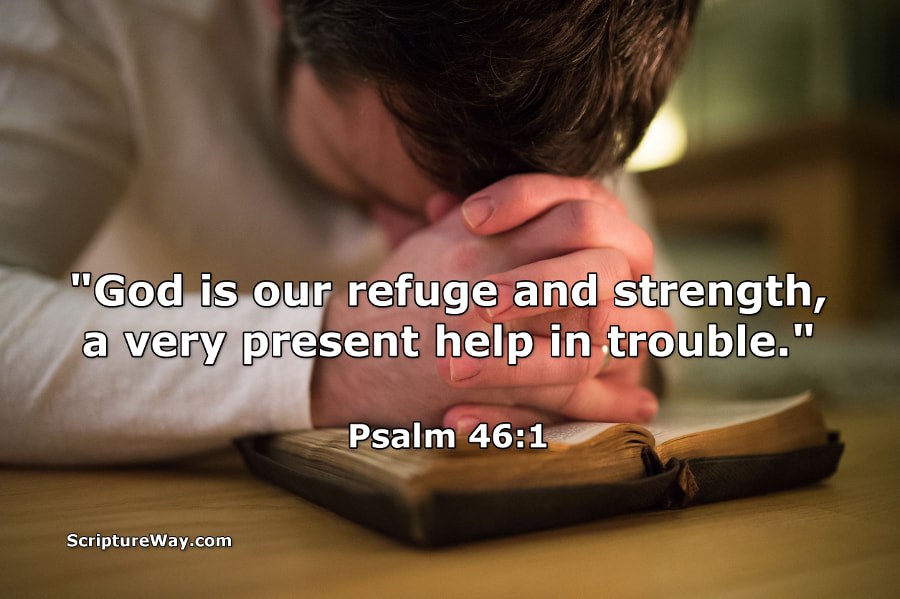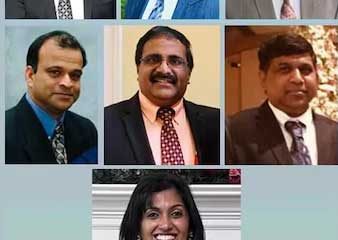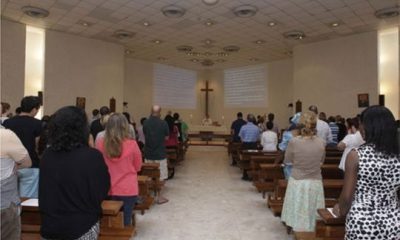Media
Christian families in India banned from burying their dead

Villagers in the east-central state of Chhattisgarh are not allowing Christians to bury their dead until they pay fines for not taking part in Hindu festivals and rituals. Attacks on the minority community in India continue despite the COVID-19 lockdown.
Christians faced stiff opposition to burying their dead in three separate incidents in the districts of Bastar and Dantewada in Chhattisgarh state last month, Alliance Defending Freedom India reported.
The Christians were told to make “restitution” for not partaking in or giving donations for religious rituals in those villages for all the years gone by, and pay an additional fine before their dead would be allowed to be buried.
“It is a terrible and unimaginable thing to be denied an opportunity to grieve the loss of a loved one with dignity,” ADF India said.
Since 2019, the group has recorded at least 15 confirmed incidents of Christians being denied burial rights in Chhattisgarh state.
After the group’s legal team intervened, “the Christians were provided police protection, and in some cases even provided land by the government, for the burials to take place.”
In April, when India was under a nationwide COVID-19 lockdown, the world’s strictest, at least six incidents of targeted violence against Christians took place in Chhattisgarh, according to ADF India. In the majority of incidents, Christians were physically attacked by mobs of at least 50 people when they refused to take part in religious rituals that violated their faith.
On April 17, villagers in Chhattisgarh state’s Mendoli area severely assaulted a Christian family, including tearing off the clothes of the victim’s wife, and forcefully performed a “sanctification ritual” on them, the U.K.-based Christian charity Barnabas Fund said, adding that the mob then demanded a fee of 5,000 Indian rupees ($66) and threatened to kill the family if they informed the police.
While India’s Grand Old Party, the Indian National Congress, has been governing Chhattisgarh state since December 2018, Hindu right-wing groups are active in the state, which was earlier ruled by the Hindu nationalist Bharatiya Janata Party, or BJP, for 10 years.
In the western city of Mumbai, which is among the worst-hit by the coronavirus outbreak in India, Christian cemeteries didn’t have a place for the burial of coronavirus victims until recently due to the absence of official notification, according to The Times of India, which reported that Christian victims of COVID-19 had no option but to cremate their dead.
“I wish to stress that coronavirus in a dead person doesn’t infect living humans,” a local activist Cyril Dara was quoted as saying. “The virus becomes ineffective within hours of the victim’s death,” he continued, adding that he would file police complaints against big cemeteries if they didn’t allow burials.
The civic authorities finally allotted space in four Christian cemeteries for the burial of coronavirus victims, the Times said.
Attacks on Christians have been on the rise since the BJP won the 2014 general elections in India. Most attacks on Christians are launched under the pretext of the alleged “forcible” conversion of Hindus.
Several Indian states have had draconian “anti-conversion” laws, termed as Freedom of Religion Acts, for decades but no Christian has been convicted of “forcibly” converting anyone to Christianity.
According to India’s own population data, the conspiracy of mass conversions to Christianity does not hold up, says the U.S.-based persecution watchdog International Christian Concern. “In 1951, the first census after independence, Christians made up only 2.3% of India’s overall population. According to the 2011 census, the most recent census data available, Christians still only make up 2.3% of the population.”
“Since the current ruling party took power in 2014, incidents against Christians have increased, and Hindu radicals often attack Christians with little to no consequences,” noted Open Doors’ World Watch List, which ranked India as the 10th worst country for Christians.
“The view of the Hindu nationalists is that to be Indian is to be Hindu, so any other faith — including Christianity — is viewed as non-Indian. Also, converts to Christianity from Hindu backgrounds or tribal religions are often extremely persecuted by their family members and communities,” Open Doors added.
At least one Christian was attacked every day last year, according to Open Doors.
Sources:Christian Post
Articles
അനുദിന ജീവിതത്തിൽ നീതിയും ന്യായവും ഉള്ളവരായിരിക്കുക

ദൈവത്തിന്റെ മുഖ്യ ഗുണങ്ങളിൽ ഒന്നാണ് നീതി. കർത്താവ് നീതിയും ന്യായവും ഇഷ്ടപ്പെടുന്നു എന്ന് സങ്കീർത്തനം 33:5 ൽ പറയുന്നു. ന്യായം ദൈവത്തിന്റെ നീതിയുടെ ഒരു അനിവാര്യ ഘടകമാണ്. യേശു ഭൂമിയിലായിരുന്നപ്പോൾ നീതിയും ന്യായവും സംബന്ധിച്ച ദൈവത്തിന്റെ നിലവാരങ്ങളെ യേശു പൂർണമായി പ്രതിഫലിപ്പിച്ചു. ദൈവത്തെക്കുറിച്ചുള്ള ന്യായവും കരുണാപൂർവമായ നീതിയും സമറിയാക്കാരനെക്കുറിച്ചുള്ള യേശു ഉപമയിലൂടെ വെളിപ്പെടുത്തി. തനിക്കു പരിചയമില്ലാഞ്ഞ, പരുക്കേറ്റ ഒരു മനുഷ്യനെ സഹായിക്കുകവഴി സമറിയാക്കാരൻ നീതിയും ന്യായവുമുള്ള കാര്യമാണു ചെയ്തത്.
ലോകത്തിന്റെ നീതിയും ന്യായവും ഒരു വാളും ഒരു തുലാസും കയ്യിൽ പിടിച്ചിരിക്കുന്ന, കണ്ണു മൂടി കെട്ടിയിരിക്കുന്ന ഒരു സ്ത്രീയായി ചിത്രീകരിക്കുന്നുണ്ട്. മനുഷ നീതി മുഖപക്ഷമില്ലാത്തതായിരിക്കാൻ, അതായത് സമ്പത്തോ സ്വാധീനമോ സംബന്ധിച്ച് അന്ധമായിരിക്കാനാണ് ഇത് കൊണ്ട് ഉദ്ദേശിക്കപ്പെടുന്നത്. പ്രതിയുടെ കുറ്റമോ നിഷ്കളങ്കതയോ അതു ശ്രദ്ധാപൂർവം തുലാസിൽ തൂക്കിനോക്കണം. വാളുകൊണ്ട്, നീതി നിഷ്കളങ്കരെ സംരക്ഷിക്കുകയും കുറ്റം ചെയ്തവരെ ശിക്ഷിക്കുകയും ചെയ്യുന്നു. എന്നാൽ ലോകത്തിലെ നീതിയും ന്യായവും പലപ്പോഴും സമ്പത്തിനാലും അധികാരത്തിനാലും സ്വാധിനിക്കപ്പെടുന്നു
ഭൂമിയിലായിരുന്നപ്പോൾ യേശു നീതിയുക്തവും ന്യായവുമായ മനോഭാവം പ്രകടമാക്കുകയുണ്ടായി. അവൻ നീതിമാനും ന്യായമുള്ളവനുമായിരുന്നു. മാത്രമല്ല, സഹായമാവശ്യമുണ്ടായിരുന്ന ആളുകൾക്കായി, കഷ്ടപ്പാടിനും രോഗത്തിനും മരണത്തിനും അടിപ്പെട്ടവരായിരുന്ന പാപികളായ മനുഷ്യർക്കായി, യേശു തന്റെ ജീവൻ നൽകി. ക്രിസ്തുവിനെ പോലെ നാം നമ്മുടെ അനുദിന ജീവിതത്തിൽ നീതിയും ന്യായവും ഉള്ളവരായിരിക്കുക. അതുപോലെ അർഹിക്കുന്ന വ്യക്തികൾക്കും നീതിയും ന്യായവും നടത്തി കൊടുക്കുക
Sources:marianvibes
Articles
ദൈവമുൻപാകെ വിനീതർക്കാണ് ദൈവം കൃപ പ്രധാനം ചെയ്യുന്നത്

ലോകദൃഷ്ടിയിൽ നീതി എന്ന വാക്കുകൊണ്ട് അർത്ഥമാക്കുന്നത് ഓരോരുത്തർക്കും അർഹമായത് അവരവർക്ക് ലഭിക്കുന്നതിനെയാണ്. എന്നാൽ ദൈവത്തിന്റെ നീതിയും നമ്മുടെ അർഹതയും തമ്മിൽ യാതൊരു ബന്ധവുമില്ലെന്നതാണ്. കാരണം, ഒരു കൈ കൊണ്ടു തലോടുകയും മറുകൈകൊണ്ട് തലയെടുക്കുകയും ചെയ്യുന്ന ദൈവമല്ല നമ്മുടെ ദൈവം. യേശു നമുക്ക് വെളിപ്പെടുത്തിത്തന്ന ദൈവം സ്നേഹമാണ്. ദൈവത്തിന്റെ നീതി അവിടുത്തെ സ്നേഹത്തിന്റെയും കരുണയുടെയും ഒരു ഭാഗമാണ്, മനുഷ്യരെ നീതീകരിച്ച് ദൈവരാജ്യത്തിന് അർഹമാക്കുവാനുള്ള ഒരു മാർഗ്ഗമാണ്. ദൈവത്തിന്റെ നീതി ശരിതെറ്റുകൾ വിലയിരുത്തി നിഷ്പക്ഷമായി വിധിക്കുന്ന ഒന്നല്ല; എന്തുവലിയ പാപം ചെയ്തിട്ടും തന്റെ മുൻപിൽ വരുന്നവരോട് യാതൊരു വിധത്തിലുള്ള നിബന്ധനകളുമില്ലാതെ ക്ഷമിച്ച്, അവർ നഷ്ടപ്പെടുത്തിക്കളഞ്ഞ അവകാശങ്ങൾ പൂർണ്ണമായും പുനസ്ഥാപിച്ചു നൽകുന്നതാണ് ദൈവത്തിന്റെ നീതി.
ദൈവത്തിന്റെ കരുണ ദൈവത്തിന്റെ ദാനമാണ്. അര്ഹതയില്ലാത്തത് ഒരാള് നമുക്കായി ചെയ്തുതരുമ്പോള് നമുക്ക് ആ വ്യക്തിയോട് കടപ്പാടും സ്നേഹവും നന്ദിയും തോന്നുന്നതുപോലെ അര്ഹതയില്ലാത്ത കരുണ നമുക്ക് ലഭിക്കുന്നതുവഴി നാം ദൈവത്തോട് കൂടുതല് നന്ദിയുള്ളവരായിരിക്കുക. അനുതപിക്കുക. പാപം ചെയ്യാതിരിക്കുക. അതിനാണ് ദൈവകരുണ. അർഹത ഇല്ലാഞ്ഞിട്ടും ദൈവം കരുണ കാണിച്ചതു പോലെ നാം മറ്റുള്ളവരോടും കരുണ കാണിക്കുക
ദൈവത്തിൻറെ മുൻപാകെ നാം ഒരോരുത്തരും വിനീതരാകുക. ദൈവമുൻപാകെ വിനിതർക്കാണ് ദൈവം കൃപ പ്രധാനം ചെയ്യുന്നത് പലപ്പോഴും ദൈവം നൽകിയ നന്മകളെ നാം സ്വന്തം കഴിവുകൾ കൊണ്ട് നേടിയത് ആണെന്ന് അഹങ്കരിക്കാറുണ്ട് എന്നാൽ നമുക്ക് കിട്ടിയത് എല്ലാം ദൈവത്തിന്റെ ദാനമാണ് എന്ന് നാം തിരിച്ചറിയുക. നീതി പ്രവര്ത്തിക്കുക; കരുണ കാണിക്കുക; ദൈവത്തിന്റെ സന്നിധിയില് വിനീതനായി ചരിക്കുക ഇതു കൂടാതെ വചനത്തിൽ അധിഷ്ഠിതമായ ജീവിതവും കർത്താവ് നമ്മിൽ നിന്ന് ആഗ്രഹിക്കുന്നു
Sources:marianvibes
Articles
കർത്താവ് നമ്മളെ ഒരു പ്രതിസന്ധിയിലും കൈവിടാതെ നമ്മളെ ചേർത്ത് പിടിക്കുന്ന ദൈവം ആണ്

ജീവിതത്തിൽ ഉറ്റവരും സ്നേഹിതരും കൈവിട്ടാലും കൈവിടാത്ത ദൈവം ആണ് നമ്മുടെ ദൈവം. ഭൂമിയിലെ ബന്ധങ്ങളിൽ ഏറ്റവും പവിത്രമായ ബന്ധമാണ് അമ്മയും കുഞ്ഞും തമ്മിലുള്ള ബന്ധം. അമ്മ തന്റെ കുഞ്ഞിനെ മറന്നാലും ആ കുഞ്ഞിനെ ദൈവം മറക്കുകില്ല എന്നാണ് ദൈവം അരുളിച്ചെയ്യുന്നത്. ദൈവത്തിന്റെ സ്നേഹം അമ്മയുടെ സ്നേഹത്തേക്കാൾ വലുതാണ്. സൃഷ്ടിച്ച ദൈവത്തിന് ഒരുനാളും നമ്മെ കൈവിട്ടു കടന്നു പോകുവാൻ സാധ്യമല്ല. കൂരിരുൾ താഴ്വരയിലൂടെ നാം നടന്നാലും, അവിടുന്ന് നമ്മോടു കൂടെ നടക്കുന്നവനാണ് നമ്മുടെ ദൈവം.
ദൈവം നമ്മെ ഒരിക്കലും ഒറ്റയ്ക്കാക്കി മാറി നിൽക്കുന്നില്ല; മറിച്ച്, നമ്മോടുകൂടെ സദാ ആയിരിക്കുവാൻ അവിടുത്തെ ഏകജാതനെ നമുക്കായി നൽകി, അവന്റെ പേര് ഇമ്മാനുവേൽ എന്നാണ്. ഇമ്മാനുവേൽ എന്ന പേരിന്റെ അർത്ഥം ദൈവം നമ്മോടുകൂടെ ഉണ്ട് എന്നാണ്. നമ്മോടു കൂടെയുള്ള ദൈവം ഒരിക്കലും നമ്മെ തനിച്ചാക്കി മാറി നിൽക്കുന്നില്ല. നമുക്കുചുറ്റും നടക്കുന്നതെല്ലാം നിശ്ചയമായും ദൈവം കാണുന്നു. നാം നമ്മുടെ പ്രതിസന്ധികളെ കാണുന്നതു പോലെതന്നെ അവിടുന്ന് അവയെ കാണുന്നു. ജീവിതത്തിൽ പ്രിയപ്പെട്ടവർ പലരും നമ്മളെ പ്രതിസന്ധിഘട്ടങ്ങളിൽ കൈവിട്ടേക്കാം എന്നാൽ കർത്താവ് നമ്മളെ ഒരു പ്രതിസന്ധിയിലും കൈവിടാതെ നമ്മളെ ചേർത്ത് പിടിക്കുന്ന ദൈവം ആണ്.
ജീവിതത്തിൽ പലപ്പോഴും നമ്മുടെ പ്രതിസന്ധി കാലഘട്ടങ്ങളിൽ നമുക്ക് തോന്നിയേക്കാം ദൈവം നമ്മുടെ കൂടെ ഇല്ലെന്ന് എന്നാൽ ദൈവം നമ്മുടെ കൂടെ തന്നെ ഉണ്ട് അവൻ നമ്മെ ഒരിക്കലും തനിച്ചാക്കി മാറിനിൽക്കുന്നവനല്ല. നമ്മുടെ ജീവിതത്തിൽ പലപ്പോഴും ദൈവം അനുവദിക്കുന്ന ഒറ്റപ്പെടലുകൾ നേരിടേണ്ടി വന്നേക്കാം എന്നാൽ ഈ ഒറ്റപ്പെടലുകൾ ഒന്നും നമ്മെ തളർത്താൻ അല്ല വളർത്താനാണ്. കർത്താവേ എന്ന ഒരു വിളി മാത്രം മതി അവൻ നമ്മുടെ അടുത്ത് ഓടി എത്തും.
Sources:marianvibes
-

 us news10 months ago
us news10 months agoനോർത്ത് അമേരിക്കൻ പെന്തക്കോസ്തൽ റൈറ്റേഴ്സ് ഫോറം : രാജൻ ആര്യപ്പള്ളി പ്രസിഡന്റ്; നിബു വെള്ളവന്താനം സെക്രട്ടറി
-

 us news8 months ago
us news8 months agoനോര്ത്ത് അമേരിക്കന് പെന്തക്കോസ്തല് റൈറ്റേഴ്സ് ഫോറം; അറ്റ്ലാന്റാ ചാപ്റ്ററിന് പുതിയ ഭാരവാഹികള്
-

 us news11 months ago
us news11 months ago‘The Biggest Water Baptism in History’: 4,166 Baptized at Historic Beach from Jesus Movement
-

 world news11 months ago
world news11 months agoMuslim Husband Found Out His Wife Became a Christian; He Beat Her, Starved Her and Left Her in a Wild Animal Park—But God…
-

 National8 months ago
National8 months agoബൈബിൾ വിതരണം ചെയ്യുന്നതും നല്ല മൂല്യങ്ങൾ പഠിപ്പിക്കുന്നതും മതപരിവർത്തനമല്ല: അലഹബാദ് ഹൈക്കോടതിയുടെ നിര്ണ്ണായക വിധി
-

 world news9 months ago
world news9 months ago37 Christians Killed in Nigeria in Three Weeks
-

 world news11 months ago
world news11 months agoലേലത്തിൽ വെച്ചിരുന്ന ലോകത്തിലെ ഏറ്റവും പഴക്കമുള്ള ഹീബ്രു ബൈബിളിന് റെക്കോര്ഡ് തുക: ലഭിച്ചത് 314 കോടിരൂപ
-

 world news11 months ago
world news11 months agoയുഎഇ യിൽ ക്രൈസ്തവ ആരാധനാലയങ്ങൾക്ക് ഇനി ലൈസൻസ് നിർബന്ധം
























